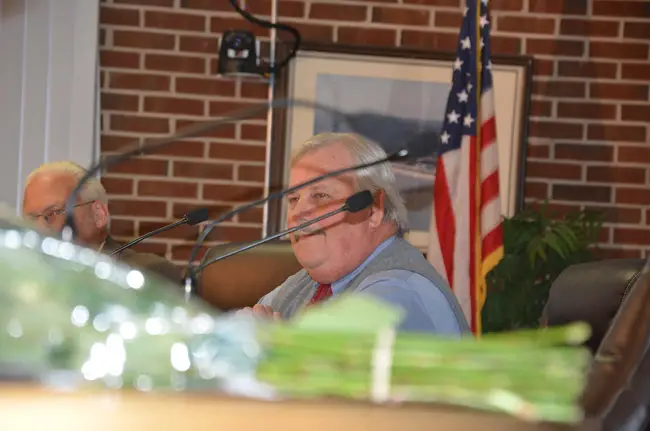
The Flagler Beach City Commission will not take a stand on Amendment 4. The commission voted Thursday evening against so much as having a discussion on the amendment, scuttling a proposed resolution that would have urged residents “to carefully consider the potential adverse consequences of Amendment 4 before voting in the November 2012 general election.”
The commission killed the measure 3-1, at the urging of Commissioner Steve Settle. The quick death of the discussion item is a reflection of the polarizing effects of Amendment 4, which has ardent anti-tax advocates–including politicians elected on limited government platforms–rallying around it while some local government representatives strain to explain its implications.
“I feel like I’m here to represent the people of Flagler Beach as their elected representative,” Settle said, explaining his opposition to having a discussion about the amendment. “Each person in Flagler Beach is going to have their own vote. This is a constitutional amendment. So I’m not representing anyone. I’m telling you what I would prefer to happen, and I prefer not doing that because what I do in the ballot box is between me and my god and no one else.”
If voters approve it, proposed constitutional Amendment 4 is certain to do one thing: further reduce local government revenue. The amendment would significantly expand the homestead exemption for first-time buyers (after a previous amendment doubled that exemption to $50,000 four years ago). It would cut in half, to 5 percent, the limit at which non-homesteaded properties like rentals and businesses may be assessed every year. And it would allow the Legislature to prohibit increases in the assessed value of homesteaded properties under some circumstances.
In sum, the proposed amendment is part of a continuing pattern by the Legislature to erode the use of property taxes as a mainstay of local government revenue. The Florida Association of Realtors is behind the amendment. It has contributed $3.5 million so far to the pro-Amendment 4 campaign.
But many local governments are opposed, and two leading voices of local government—Palm Coast Mayor Jon Netts and Flagler County Commission Chairman Barbara Revels—have spoken strongly against the amendment. Revels is doing so even though she is a Realtor and a builder, whose business would likely benefit from the measure. She calls the amendment “shortsighted.” Netts said the amendment would make local tax structures “screwier” than they already are.
But neither were speaking as official representatives of their respective governments. Revels spoke in an interview with a reporter, and Netts brought up the matter merely as a discussion item during a council meeting–not as a formal vote, which did not take place–a reflection of the sensitivity of the issue, which is dividing politicians. Council member Bill McGuire subsequently (in a comment here) specified that Netts was speaking only for himself. “This amendment was not a discussion or workshop item at the city council,” McGuire wrote. “The Mayor made his opinion known during the final comment phase of the meeting. The city council was not expected to nor prepared to opine as to Amendment 4. The Mayor was expressing his personal opinion and not putting something on the table for council discussion.”
The Florida League of Cities is leading the charge against the amendment on behalf of local governments. It is circulating a draft resolution that doesn’t take an explicit stand against Amendment 4, though the implication is clear. The resolution states that “Amendment 4 shifts the tax burden to new or growing businesses, creating an unfair disadvantage for new businesses that would have to pay higher property taxes than their more established counterparts.” The resolution also underscores the growing inequities in the state’s property tax system—inequities exacerbated in recent years, according to the league, by the addition of numerous tax breaks for segments of homeowners (the elderly, veterans, families of first responders) and expansions of exemptions.
James Gardner, the Flagler County property appraiser, last month described the proposal not as a tax cut, but as a tax shift.
Flagler Beach’s city clerk said the draft resolution was added to the agenda at the request of commissioners earlier this month. But before they had a chance to discuss it, Settle objected to it being so much as a discussion item.
“In our charter, I’m required to vote yea or nay, although I’m not really prepared to debate the substance on this,” Settle said. “I can’t take a bye and say, I pull my vote.” He described himself as “uncomfortable” with being faced with the issue publicly. “I think the people of Flagler Beach are the most intelligent people I’ve met in my life. They don’t need me to tell them—and who am I to tell somebody how to vote on a constitutional amendment, so I would ask that it’d be taken off the agenda.”
The resolution would not have asked voters to take a stand for or against the amendment, however, but merely be aware of the implications. The proposed amendment is being put forward by the Florida Legislature. It is one of 11 proposed amendments on the Nov. 6 ballot.
Commissioners voted 3-1 to pull the item from the agenda, with Settle, Kim Carney and Marshall Shupe voting in the majority, and Commission Chairman Jane Mealy voting in dissent. Commissioner Joy McGrew was absent from the meeting Thursday.





























Anita says
The resolution states that “Amendment 4 shifts the tax burden to new or growing businesses, creating an unfair disadvantage for new businesses that would have to pay higher property taxes than their more established counterparts.”
What happened to GOP concern for small businesses? They are the ones who will be hit hardest. I own both a home and rental property and I urge voters to vote “NO” to this amendment that, coupled with Amendment #3, is guaranteed to starve Flagler County coffers of the necessary funds to maintain county infrastructure and will mean the death of any hope of revitalizing public school education in Flagler County.